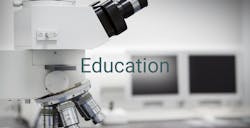Emerging education program assists cytotechnologists in a changing landscape
Cytotechnologists are medical laboratory professionals who study human cellular samples for evidence of cancer and other diseases. Perhaps the most well-known part of their professional practice work is the screening of Pap tests. As a fundamental driver of women’s gynecologic health, the Pap test has also been the “bread and butter” and a significant portion of the cytology laboratory test volume for over 60 years. Over the past decade, however, laboratories have seen a decline in Pap test volumes due to changing screening frequency recommendations, increased efficiencies in Pap test throughput as a consequence of new computer-assisted screening technologies, and primary HPV testing, which was recently approved by the U.S. Food and Drug Administration (FDA) as an equivalent cervical cancer surveillance test. These technological changes are combining to change the employment landscape as we know it for cytotechnologists.
In addition to the decrease in Pap tests, volumes for other more complex cytology tests have increased in many laboratories. Fine needle aspiration (FNA) and body fluid samples are more complex, requiring more time and evaluation from cytotechnologists. Ancillary tests for these samples, such as immunohistochemistry (IHC) tests, are also increasing and changing rapidly. This will require cytotechnologists to change and expand their skill sets to support these changes in workload. Cytotechnologists, with the support of professional organizations, are coming together to address these anticipated changes.
In 2014, through a memorandum of understanding and in support of the evolving cytopathology profession, a new workgroup, the “ASC/ASCP Workgroup: Focusing on Emerging Roles in Cytopathology,” was named by the leadership of both the American Society of Cytopathology (ASC) and the American Society for Clinical Pathology (ASCP). The collaboration between ASC and the ASCP is designed to help cytotechnologists identify emerging opportunities and strengthen their skill sets to ensure that they continue to be considered an essential part of clinical care team as the industry evolves.
The ASC/ASCP workgroup is focusing on developing concrete goals toward addressing evolving practice changes while ensuring that education, practice, and trending data support the cytotechnology profession’s longevity and livelihood, and supporting new roles for pathologists as cytotechnologists are increasingly expected to engage in the rapidly changing healthcare delivery system. Recognizing that change for cytotechnologists is both evident and inevitable, the workgroup is gathering and triaging data, creating practice opportunities, and developing applicable educational activities.
With education as a key concern for this workgroup, the Advanced Cytopathology Education (ACE) program has been working collaboratively to help cytotechnologists grow to meet both current and evolving responsibilities. This collaboration between ASC and ASCP is designed to support cytotechnologists as they identify emerging opportunities and strengthen their skill set through personalized education.
The launch of the ACE program took place in June 2015 at Thomas Jefferson University in Philadelphia. Educational offerings were personalized based on regional survey data to engage cytotechnologists in various stages of their careers and to help them develop new and emerging skills to meet the latest healthcare advances and challenges. A theme of the meeting was the inclusion of cytotechnologists as part of the clinical team so that they can leverage their morphologic skills and laboratory knowledge to assist clinicians such as radiologists and pulmonologists, as well as cytopathologists, in diagnostic assessments. As Prabodh Gupta, MD, an internationally-renowned cytopathologist and Professor of Pathology and Laboratory Medicine at the Hospital of the University of Pennsylvania, Philadelphia, says, “Cytotechnologists need to be considered an essential part of the clinical care team.”
Interactive educational sessions at the ACE launch focused on (a) FNA adequacy assessment, (b) cell block interpretation, (c) procedurally-related FNA techniques, (d) molecular diagnostics and (e) immunocytochemistry and immunohistochemistry interpretation.
Focus groups were employed as a tool to engage the audience. Small groups of eight to 10 cytotechnologists, representing different career levels, were interviewed by ACE faculty in order to bring concerns and information back to the workgroup to provide further insights into work being done on both the profession’s current and future needs.
A popular feature of the ACE meeting was a platform for selected cytotechnologists to share their real-life stories about how they transitioned into new careers with knowledge of laboratory information systems (LIS), new technology, education, and performing as part of the clinical diagnostic team. Many of the new services and skills needed to extend a cytotechnologist’s scope of practice represent a natural extension of their current professional duties. As a result of the first ACE meeting, other work is being done toward transitioning to an entirely new profession. ASC and ASCP are collaborating on how to redefine education for cytotechnologists for the future.
The ACE meeting will travel around the country to engage professionals where they live and work, as cytotechnologists cannot always travel to national professional meetings. The program content will also be personalized according to the region, in recognition of the fact that different regions may have differing needs. A second ACE meeting will be held May 21-22, 2016, at Loyola University Medical Center in Maywood, IL, which is a suburb just west of Chicago.
Based on the results of a nationwide assessment survey to define cytotechnologists’ needs, ACE 2016 at Loyola is adding workshops in laboratory management and rapid on-site evaluation (ROSE). Respondents also expressed interest in molecular diagnostics, endoscopic ultrasound (EUS), and endobronchial ultrasound (EBUS) assessments and procedures, knowing that an understanding of those procedures improves their performance as part of the clinical care team. Additionally, telepathology was identified as a target for education, as this ever-expanding technology is reaching into more hospitals and care centers. This ACE meeting will be held in conjunction with the ASC Executive Board meeting and will engage many of these board members as faculty. The ACE meeting platform will continue to evolve as more information is gathered from attendees through the use of focus groups and as needs are assessed across the country.

